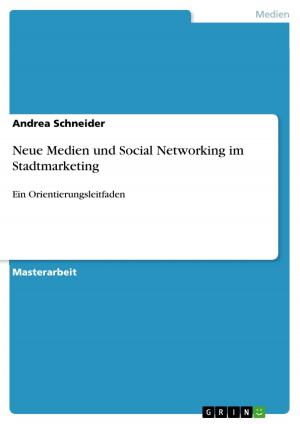| Author: | Kristina Eichhorst | ISBN: | 9783656122180 |
| Publisher: | GRIN Verlag | Publication: | February 7, 2012 |
| Imprint: | GRIN Verlag | Language: | English |
| Author: | Kristina Eichhorst |
| ISBN: | 9783656122180 |
| Publisher: | GRIN Verlag |
| Publication: | February 7, 2012 |
| Imprint: | GRIN Verlag |
| Language: | English |
Seminar paper from the year 2010 in the subject English Language and Literature Studies - Linguistics, grade: 1,0, Ernst Moritz Arndt University of Greifswald, language: English, abstract: For me, learning English has always been quite easy. Though I grew up as a monolingual person and my first contact with English was not until the fifth grade, I have been surrounded by this language constantly. When I first started to translate my favorite pop songs into German I became more and more familiar with English. As the following paragraphs show this is exactly one of the reasons that people are so familiar with it nowadays, and that made me think about this language a little bit more intensive: English is everywhere, even in an official monolingual country like Germany. Though it helps us to get a better understanding for many terms in the world, there is also a negative side. I think that a conversation held in German should not contain more English words than necessary or even 'poison' it. Though the influence of the English language on German is undeniable it should never dominate the other language. This term paper deals with the status of English as a global language. It shows how far English is spread nowadays and also tries to find answers to the question why English of all the many languages in the world is so influential? Therefore, historical, grammatical and other reasons are investigated. Afterwards, the paper presents the two sides of the English status, namely advantages that come with it but also the negative effects that occur. Finally, there is a look at the future of the English language in order to find out if the influence will increase even more or be replaced by a different language. Many linguists have studied this field and see English especially in relation to language death. This paper shows that the topic is very complex and that it cannot be committed to either positive or negative.
Seminar paper from the year 2010 in the subject English Language and Literature Studies - Linguistics, grade: 1,0, Ernst Moritz Arndt University of Greifswald, language: English, abstract: For me, learning English has always been quite easy. Though I grew up as a monolingual person and my first contact with English was not until the fifth grade, I have been surrounded by this language constantly. When I first started to translate my favorite pop songs into German I became more and more familiar with English. As the following paragraphs show this is exactly one of the reasons that people are so familiar with it nowadays, and that made me think about this language a little bit more intensive: English is everywhere, even in an official monolingual country like Germany. Though it helps us to get a better understanding for many terms in the world, there is also a negative side. I think that a conversation held in German should not contain more English words than necessary or even 'poison' it. Though the influence of the English language on German is undeniable it should never dominate the other language. This term paper deals with the status of English as a global language. It shows how far English is spread nowadays and also tries to find answers to the question why English of all the many languages in the world is so influential? Therefore, historical, grammatical and other reasons are investigated. Afterwards, the paper presents the two sides of the English status, namely advantages that come with it but also the negative effects that occur. Finally, there is a look at the future of the English language in order to find out if the influence will increase even more or be replaced by a different language. Many linguists have studied this field and see English especially in relation to language death. This paper shows that the topic is very complex and that it cannot be committed to either positive or negative.















